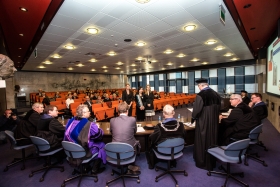PhD Defence: Corporate Reputation Management
Corporate Reputation Management: Reaching Out to Financial Stakeholders
Corporate reputation management contributes to both attracting financial stakeholders as well as achieving a superior financial performance of the company. In her PhD dissertation, entitled <link doctoral-programme phd-in-management phd-projects detail>Corporate Reputation Management: Reaching Out to Financial Stakeholders, Yijing Wang provides managers with guidelines to manage a good corporate reputation in order to create a distinct competitive advantage.
In her dissertation, Wang aims to provide insight into whether, why, and when different dimensions of corporate reputation can influence preferences and decisions of financial stakeholders. She finds that simply boosting a firm’s visibility without improving its corporate reputation is harmful to a firm’s market performance. To form a positive perception amongst financial stakeholders, managers can target at improving the firm’s performance on aspects that directly determine reputation amongst financial stakeholders such as corporate philanthropic commitments. Another option would be to focus on influencing the perceptions amongst public stakeholders. The latter choice provides managers with an alternative manner to attract investors indirectly, and generates more flexibility to managers in stakeholder management.
Findings in this dissertation also suggest that product strength and innovation both play an important role in tying bonds between firms and financial stakeholders. They offer twofold benefits for a firm’s capital structure management in terms of competitive advantage with a low financing cost as well as a great financing flexibility. Wang argues that in order to achieve a healthy capital management and a persistent superior performance, managers need to commit to continuously developing product advantages and product innovations within their firm.
Yijing Wang defended her dissertation on 8 February 2013. Her supervisor was <link people cees-van-riel>Professor Cees van Riel. Her co-supervisor was <link people guido-berens>Guido Berens. Other members of the Doctoral Committee were <link people peter-roosenboom>Professor Peter Roosenboom, Professor Stephen Brammer, <link people pursey-heugens>Professor Pursey Heugens, Professor Michael Barnett and Professor Kees Koedijk.
About Yijing Wang
 Yijing Wang (China, 1981) obtained her master’s degree in financial economics with distinction from the Erasmus School of Economics, Erasmus University in January 2008. She started her PhD in the Department of Business and Society Management at RSM in September 2008. Prior to studying in the Netherlands, Yijing obtained a Bachelor of International Finance with distinction from Soochow University and worked for Shanghai Pudong Development Bank and Air Macau in China.
Yijing Wang (China, 1981) obtained her master’s degree in financial economics with distinction from the Erasmus School of Economics, Erasmus University in January 2008. She started her PhD in the Department of Business and Society Management at RSM in September 2008. Prior to studying in the Netherlands, Yijing obtained a Bachelor of International Finance with distinction from Soochow University and worked for Shanghai Pudong Development Bank and Air Macau in China.
Currently, her main research interests are corporate reputation management and corporate social responsibility, especially the impacts of intangible assets on financial performance, such as strengthening the capital market competitiveness and improving the firm value. One of her research projects from this dissertation has been published in the Corporate Reputation Review, and others are currently under review. At RSM, she has been involved in supervising students at both undergraduate and graduate levels. In addition, Wang has organised a symposium on the Economic Value of Corporate Reputation with Professor Cees van Riel and Guido Berens, and has presented her research at international conferences such as the Academy of Management Meeting, the International Conference on Corporate Reputation, Brand, Identity and Competitiveness, and the International Conference of the Corporate Identity/Associations Research Group.
Abstract of Corporate Reputation Management: Reaching Out to Financial Stakeholders
Corporate reputation is important for firms’ long-term performance and competitive advantages. This dissertation sets out to understand the relationship between corporate reputation and a company’s attractiveness to financial stakeholders from different angles. Specifically, Wang examines the role of corporate reputation in the context of the agency problem to explain the causal chain through which the
uncertainties and risks are mitigated for investors. This dissertation contributes to the multifaceted conceptualisation of reputation. Firstly, by examining different economic values of overall corporate reputation and its pre-condition — visibility. Secondly, by considering reputation amongst different stakeholders — public stakeholders and financial stakeholders. And finally, by distinguishing two
dimensions of financial reputation — trustworthiness and attractiveness. Acknowledging this
multifaceted conceptualisation of corporate reputation is crucial for firms to develop effective strategies  for reputation management, and further achieving competitive advantages. The overarching finding across the studies is that reputation management contributes to both attracting financial stakeholders and achieving a superior financial performance of the corporation. Particularly, Wang identified the mediating role of financial reputation in the mechanism through which public reputation affects financial performance. This result also contributes to the understanding of how reputations amongst different stakeholder groups affect financial performance differently.
for reputation management, and further achieving competitive advantages. The overarching finding across the studies is that reputation management contributes to both attracting financial stakeholders and achieving a superior financial performance of the corporation. Particularly, Wang identified the mediating role of financial reputation in the mechanism through which public reputation affects financial performance. This result also contributes to the understanding of how reputations amongst different stakeholder groups affect financial performance differently.
- <link doctoral-programme phd-in-management phd-projects detail>Download Wang's dissertation
- View photos of her defence



